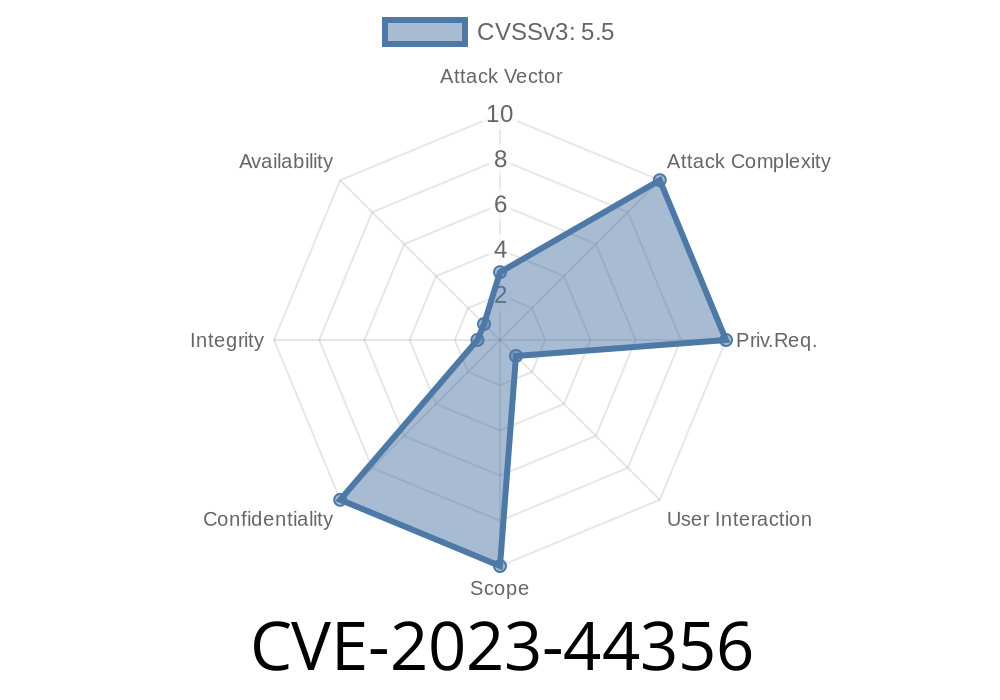Adobe Acrobat Reader is one of the world’s most popular PDF readers, but popularity also means hackers often target it. Late in 2023, security researchers uncovered a worrying flaw: CVE-2023-44356, a vulnerability that can leak memory and even help bypass important Windows security features like Address Space Layout Randomization (ASLR). Let's break it down in simple terms, show an example, and talk about whether you need to worry.
What Is CVE-2023-44356?
CVE-2023-44356 is what security folks call an out-of-bounds read. That means a program reads more memory than it should have access to. Imagine reading the next page in a book, even though you’re supposed to stop at the end of the chapter — you might see info you shouldn’t.
20.005.30524 (and before)
an attacker can trick the program into leaking sensitive bits of memory just by opening a specially designed PDF file. This memory could include anything: credentials, encryption keys, or data that helps attackers figure out how to run further attacks. Worst of all, this flaw could allow them to bypass mitigations such as ASLR, making more serious attacks possible.
Sensitive memory content leaks, potentially revealing info that shouldn’t be seen.
This can't happen automatically; the victim has to open the file. Still, it's a popular real-world attack method (phishing emails with PDF attachments).
Exploit Details and Example
The technical details of the bug revolve around how Acrobat Reader parses certain sections of a PDF. A malformed embedded font or object in a PDF can cause Acrobat Reader to read more bytes than intended, picking up data from memory that the attacker can capture.
Here’s a simple example (pseudocode), inspired by real-world exploits
// Pseudo-C snippet illustrating an out-of-bounds read
void parse_pdf_object(const uint8_t *data, size_t len) {
uint8_t header = data[];
uint32_t size = *(uint32_t *)(data + 1); // Size taken from data
// Fault: No check to see if (size < len)
uint8_t buffer[256];
memcpy(buffer, data + 5, size); // Could read outside 'data'
}
If size is too big, memcpy can read whatever happens to be next in memory.
A specially crafted PDF takes advantage of this, causing Acrobat to include out-of-bounds information in error messages, form fields, or by some other feedback channel.
Why does this matter for attackers?
- Information Disclosure: Leaked memory may include security tokens, login credentials, personal info—or even addresses in memory. The latter is key for bypassing ASLR, a common defense that randomizes memory locations to make exploitation tougher.
- Stepping stone for more attacks: By knowing where things live in memory, attackers can plan further attacks, like code execution.
You can see the official Adobe post here:
Adobe Security Bulletin APSB23-34
Also, check the MITRE CVE page:
CVE-2023-44356 at CVE.org
Proof-of-Concept Example
A fully working exploit isn't public (yet), but here's a conceptual example of how an attacker might craft a PDF object to leak memory:
// Inside PDF with embedded JavaScript, simplified:
this.getAnnots()[].richContents = "AAAAAAAAAAAAA..."; // Large payload to trigger out-of-bounds read
var leak = this.getAnnots()[].richContents; // Now 'leak' may contain extra memory!
In reality, the PDF format allows many kinds of objects, and skilled attackers fiddle with low-level PDF structures to get the result they want.
How To Stay Safe
Update!
Adobe has released patches. If you’re not sure, open Acrobat, go to Help > Check for Updates.
Don’t open strange PDFs.
Be extra careful with email attachments, especially from people you don’t know.
Patch regularly.
This kind of memory leak can enable even nastier attacks in the future.
More Reading & References
- Adobe Security Bulletin APSB23-34
- CVE-2023-44356 on NIST
- Acrobat & Reader Release Notes
Conclusion
CVE-2023-44356 in Acrobat Reader may seem like just another bug, but it’s a real risk to anyone who isn’t careful about keeping their software up to date. Even if you only read PDFs from trusted sources, updating is easy insurance—and as attacks get smarter, out-of-bounds bugs like this one could lead to much bigger security incidents.
Timeline
Published on: 11/16/2023 10:15:12 UTC
Last modified on: 12/04/2023 16:15:08 UTC
